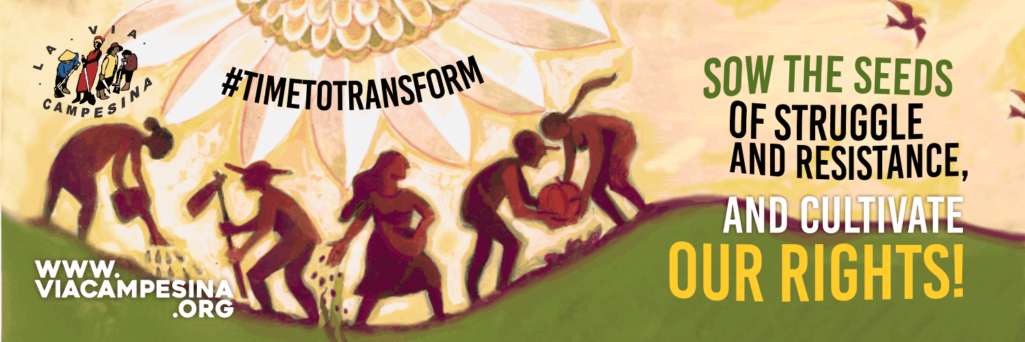La Via Campesina (LVC) is a champion for the rights of small-scale food producers, working for food sovereignty and social justice, and struggling in solidarity with peasant farmers, small- and medium-sized producers, rural women, indigenous people, rural youth and agricultural workers to improve their rights. And they have had success. With the adoption of the UN Declarations of the Rights of Peasants in 2018, La Via Campesina found success. But their work continues, as they now support governments to put this declaration into action.
La Via Campesina is an autonomous, international, and multicultural movement with member organizations in more than 70 countries around the world. Over its 27 years of existence, it has been the first and is today one of the main global forces in the movement for food sovereignty. In Africa, La Via Campesina has 16 member organizations in 15 countries. The movement has been in Africa since 2004, since joining the National Peasants Union of Mozambique (UNAC). The international headquarters of La Via Campesina is hosted by Zimbabwe Smallholder Organic Farmers Forum (ZIMSOFF), in Harare.
La Via Campesina’s members are all grassroots organizations with common vision, principles, and practices. La Via Campesina is set up in such a way that the members and their leadership are the main decision-makers in the movement. Solidarity is the foundation of La Via Campesina and it is reflected in their slogan “Globalize the Struggle, Globalize Hope”. Everyone is heard and all issues are used to develop alternatives or call for public policies that benefit the majority.
The UN Declarations of the Rights of Peasants and Other People Working and Living in Rural Areas (UNDROP) is one such policy. This declaration states that peasants and other women and men working in rural areas have rights to access natural resources and biodiversity, food sovereignty, security and justice, as well as other issues.
But a UN declaration is not enough. Mateus Santos is a coordinator in the La Via Campesina Africa team. He explains that LVC aims to be and create the space for peasant voices to be directly heard in critical policy spaces at international, regional, and national levels. In this way, peasant food producers help to develop policies that address their needs and interests. In these spaces, farmers and other small-scale food producers have defended their way of life and, more importantly, internalized and globalized their struggles for a better society based equity, dignity and food sovereignty principles.
La Via Campesina continues to demonstrate the solidarity for peasant farmers across national borders and international so that governments and other international organizations can recognize their value. This work isn’t without challenges. Communication is a major challenge, particularly in Africa, where technology and infrastructure is less developed. Further, Africa is home to rich linguistic diversity, which must be bridged so that the voices of one group can be heard and understood by another.
Elizabeth Mpofu, is a member of the Zimbabwe Smallholder Organic Farmer Forum (ZIMSOFF), and general coordinator for La Via Campesina, says “Our vision is to be able to embrace this diversity, which will ultimately only strengthen the African peasant voice and understanding of its rights and duties as key actors in the nourishment of our communities – rural and urban – and the maintenance of nature and what we consider natural resources.”
Key to this is peasant agroecology, applying ecological processing to agricultural practices. Ndiakhate Fall is a member of the National Council for Consultation and Cooperation of Rural People (CNCR) inS enegal. He is also a member of the global coordination of LVC. He says “the recognition of peasant agroecology at FAO is a huge success for traditional and peasant way of life.” As part of a global initiative, La Via Campesina is strengthening and expanding its agroecology schools network in Africa, with its first African Continental Encounter taking place in Zimbabwe in August 2019.
Agroecology, and peasant agroecology in specific, may be more important now than ever. Mrs. Mpofu says “Now is the time to reinforce agroecological food production and consumption and make it available to all. Peasants and small family farmers need land, seeds, water, peace and all the conditions to feed the populations safely. Such rights are what peasants urgently need during this COVID-19 crisis and beyond.”
Further, as the COVID-19 pandemic disrupts global supply chains, it highlights the important of local food production and distribution. Now is the time to talk about food sovereignty, Mrs. Mpofu adds, noting that the global peasant movements believes this is only possible with sustainable and broad-based small-scale food production, including family farming through peasant agroecology
___
Story written by Busi Ngcebetsha
For more information about La Via Campesina, go to their website: https://viacampesina.org/en/. Or contact Mateus Santos at: [email protected]

